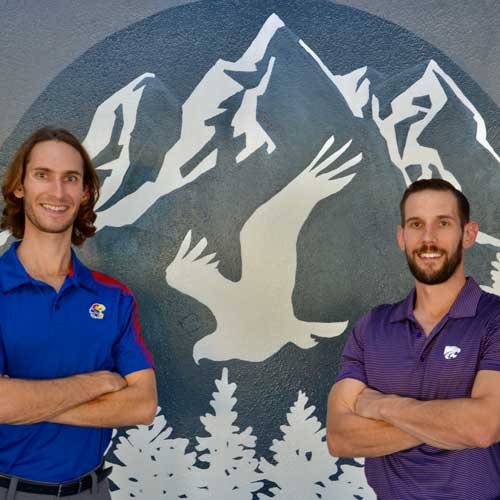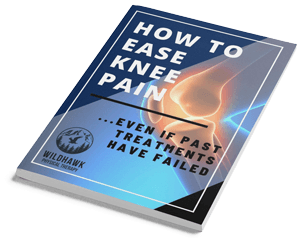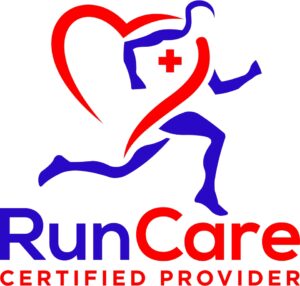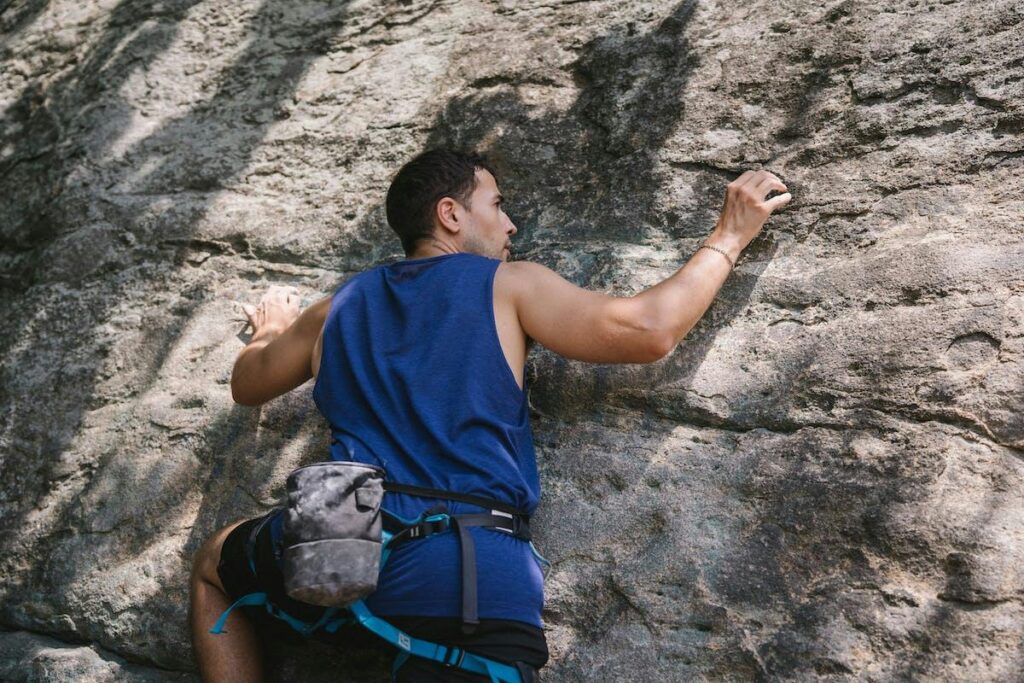
Introduction
Welcome to another insightful blog post from WildHawk Physical Therapy. In this comprehensive article, we’ll ascend the heights of knowledge to explore the dynamic world of rock climbing and its implications on shoulder health. For avid climbers and those venturing into this exhilarating activity, understanding the nuances of shoulder injuries, their prevention, and effective management is paramount for a sustained and enjoyable rock climbing journey.
Rock Climbing and Shoulder Dynamics
Rock climbing is a thrilling adventure that demands strength, flexibility, and precision. Central to this physical pursuit is the intricate interplay of the shoulder joints, making them susceptible to unique challenges and potential injuries. Before we delve into the specifics of shoulder injuries, let’s unravel the complexity of shoulder dynamics in rock climbing.
Shoulder Anatomy in Rock Climbing
The shoulder is a complex joint, comprising the glenohumeral joint, acromioclavicular joint, and sternoclavicular joint. In rock climbing, the glenohumeral joint, where the arm connects to the shoulder blade, is particularly engaged. The constant reaching, pulling, and lifting in climbing demand a robust and flexible shoulder complex.
Common Shoulder Injuries in Rock Climbing
Understanding the types of shoulder injuries prevalent in rock climbing is essential for both prevention and effective management. Here are some common shoulder injuries climbers may encounter:
- Rotator Cuff Strains/Tears: The rotator cuff, a group of muscles and tendons stabilizing the shoulder, can experience strains or tears due to overuse or sudden, forceful movements. Climbers often engage these muscles intensely, especially during dynamic movements.
- Labral Tears: The labrum is a cartilage ring that deepens the shoulder socket, providing stability. Overloading the shoulder with repetitive movements or falls can lead to labral tears, impacting the climber’s ability to maintain stability during climbs.
- Impingement Syndrome: Climbers are prone to impingement, where the rotator cuff tendons are compressed during overhead movements. This can result in inflammation and pain, affecting the climber’s range of motion and strength.
- Instability: The nature of climbing, with its diverse range of motions, can contribute to shoulder instability. Dislocations or subluxations may occur, especially if there is an imbalance in muscle strength and stability.
Preventing Shoulder Injuries in Rock Climbing
Prevention is the key to a sustained and enjoyable rock climbing experience. Consider the following strategies to safeguard your shoulders:
- Proper Warm-Up: Prioritize a thorough warm-up routine that includes dynamic stretches and mobility exercises. Focus on gradually increasing blood flow to the shoulder muscles and improving range of motion.
- Strengthening Exercises: Incorporate specific shoulder-strengthening exercises into your training regimen. Emphasize rotator cuff exercises, scapular stability exercises, and overall shoulder conditioning to fortify the muscles supporting the shoulder joint.
- Technique Refinement: Work with experienced climbers or coaches to refine your climbing technique. Efficient movement patterns can reduce stress on the shoulders and decrease the risk of overuse injuries.
- Rest and Recovery: Ensure you allow adequate time for rest and recovery between climbing sessions. Overtraining can lead to fatigue and increase the risk of injuries. Listen to your body and prioritize recovery to maintain optimal shoulder health.
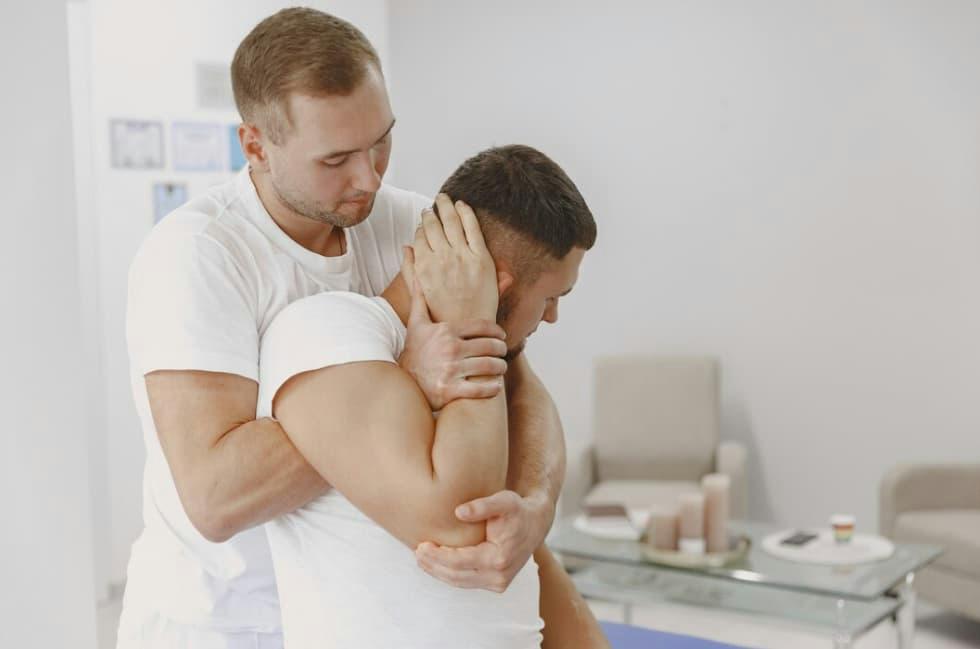
Managing Shoulder Injuries: The Role of Physical Therapy
In the event of a shoulder injury, prompt and effective management is crucial for a swift recovery. Physical therapy plays a pivotal role in addressing shoulder injuries in rock climbers. Here’s what climbers can expect from physical therapy:
- Comprehensive Assessment: A physical therapist will conduct a thorough assessment to understand the nature and extent of the shoulder injury. This may include range of motion tests, strength assessments, and a review of climbing technique.
- Individualized Treatment Plans: Based on the assessment, a personalized treatment plan will be crafted to address the specific needs of the climber. This may involve targeted exercises to strengthen weakened muscles, improve flexibility, and enhance overall shoulder stability.
- Manual Therapy Techniques: Physical therapists may employ hands-on techniques to alleviate pain, improve joint mobility, and address soft tissue restrictions. Techniques such as joint mobilization, massage, and stretching can play a crucial role in the rehabilitation process.
- Functional Training: Climbers can benefit from functional training that replicates the demands of rock climbing. This may involve exercises that mimic climbing movements, helping to rebuild strength and coordination specific to the sport.
- Gradual Return to Climbing: A phased approach to returning to climbing will be established, considering the climber’s progress and ensuring a safe and sustainable return to the activity. This may involve modified climbing exercises and ongoing monitoring of shoulder health.
FAQ Section
Frequently Asked Questions:
Q: Can rock climbing lead to long-term shoulder damage?
A: While rock climbing is an intense physical activity, when practiced with proper technique, adequate warm-up, and strength training, the risk of long-term shoulder damage is minimized. Regular assessment of climbing techniques and addressing any discomfort promptly can contribute to sustained shoulder health.
Q: Are shoulder injuries in rock climbing common for beginners?
A: Beginners may be more prone to shoulder injuries if they lack proper technique and conditioning. However, with guidance from experienced climbers or coaches, gradual progression, and attention to proper warm-up and strength training, beginners can reduce the risk of shoulder injuries.
Q: Can climbers with a history of shoulder injuries continue to enjoy rock climbing?
A: Climbers with a history of shoulder injuries can often continue enjoying rock climbing with proper rehabilitation and ongoing shoulder care. Physical therapy can help address underlying issues, strengthen the shoulder, and provide strategies for injury prevention.
Q: Are there specific exercises climbers can do to prevent shoulder injuries?
A: Yes, climbers can incorporate specific exercises into their training routine to prevent shoulder injuries. These may include rotator cuff exercises, scapular stability exercises, and overall shoulder conditioning. A physical therapist or fitness professional can guide climbers in designing a tailored exercise program.
Conclusion
In conclusion, rock climbing offers a thrilling adventure, and maintaining optimal shoulder health is essential for a sustainable and enjoyable climbing experience. By understanding the dynamics of shoulder injuries, prioritizing prevention strategies, and seeking timely physical therapy intervention, climbers can navigate the heights with confidence. Whether you’re a seasoned climber or a beginner, the key to longevity in this exciting pursuit lies in proactive shoulder care and a commitment to the principles of injury prevention and rehabilitation.

